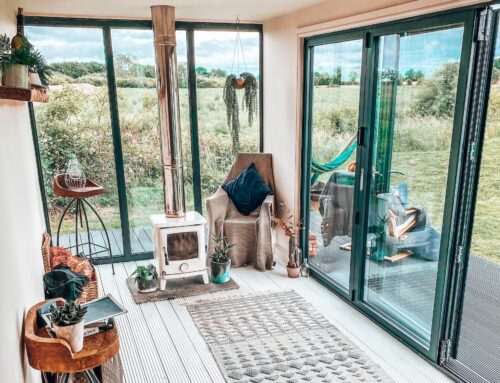Disclaimer: This information is meant for educational purposes only and is not intended to be used as financial advice. Always seek the assistance of a professional before making such a large financial decision.
An accessory dwelling unit has a lot of potential benefits for homeowners. It can provide extra space, add value to your property, and even bring in additional income as a rental unit. Accessory units also tend to cost significantly less than a traditional home. But unless you have the cash to pay for the cost of building an ADU, you’ll have to find a way to finance it.
Financing an ADU works differently than financing your primary home or even a more traditional rental property. However, many lenders have recognized the growing popularity of ADUs and now offer options to finance building one.
Can You Get an ADU Mortgage?
Generally speaking, you can’t get a standard mortgage to finance an ADU like you would for more traditional types of properties. This is because they are considered to be an addition to a property rather than an independent property. As a result, lenders can’t as easily put a lien on an ADU or repossess it if a borrower fails to meet payment obligations. This means that ADUs aren’t backed by their own value as collateral for the loan and are riskier for lenders to finance.
ADU Financing Options
While you aren’t likely to get a mortgage to build an ADU, you do have several options. These options typically require you to have significant equity in your home that you can borrow against or withdraw. Loans for ADU builds also tend to come with higher interest rates than a traditional mortgage.
It’s good to understand what your options are and how they differ. However, we have built a network of lenders that specialize in financing ADUs. Our team can help save you the stress of searching for financing by pairing you with a lender that meets your needs. Click the button below to learn about your ADU financing options.
HELOC Loans
A home equity line of credit, or HELOC, is a type of financing that functions differently than a traditional mortgage. Rather than a loan of a set amount that you pay back in monthly payments over an agreed-upon period of time, a HELOC loan provides a revolving line of credit as the name suggests.
In practice, this means that a HELOC is similar to a credit card. Your lender will issue you a line of credit based on the equity in your home and you can use these funds as needed. Unlike a credit card, however, HELOCs come with an expiration date. Your HELOC will come with a draw period during which you can use the funds you have available. Once this period ends, you will enter the repayment period. During this period, you can no longer withdraw funds and instead can only make payments towards the loan.
Since a HELOC borrows money against your home’s equity, lenders will put a lien on your property until you have repaid the loan in full. This means that if you fail to meet payments, your property will be at risk of repossession.
Home Equity Loans
A home equity loan also allows you to borrow money against the equity you’ve built up in your property. However, these loans function more like a traditional mortgage or personal loan than a HELOC.
When you take out a home equity loan, you receive the money in one lump sum and make regular payments until it is paid off. While these loans aren’t as flexible as a HELOC, they may be more accessible to many borrowers as they are often seen as less risky by lenders.
Construction and Renovation Loans
Many banks, credit unions, and other lenders offer home construction and renovation loans to help finance home improvement projects. Some lenders will allow you to use this type of loan to finance building an ADU since they add value to your property.
Renovation loans also work like a traditional loan. You borrow a set amount from your lender to finance your project and pay it off over an agreed-upon term. This can be a good option if your lender offers it, but many lenders will not approve a home renovation loan for financing an ADU.
Cash-Out Refinance
Another option is to refinance your mortgage and withdraw equity you’ve built up as cash to pay for ADU construction. This, of course, only works if you have more equity in your home than it will cost to build your accessory unit.
In contrast with the other loan products listed in this article, this is a traditional mortgage. It’s just not a mortgage on the ADU itself. Rather, it is another mortgage on your property as a whole that replaces your current mortgage.
This can be a good option in some cases as it can be simpler and sometimes less expensive than other loan products. However, with interest rates currently at their highest in quite some time, your new interest rate might be much higher than your current one. And since you’ll be paying that interest on a mortgage for your total property and not just a loan for your ADU, even a small increase in interest could result in you paying significantly more towards interest.
What Is The Best Way to Finance an ADU?
There is no one right way to finance an ADU. The best option for you will depend on your financial situation, your lender, and how you want to manage your finances. In the section below, we’ve provided some tips on how to find an ADU financing option that works for you.
How To Choose the Best ADU Financing Option For You
In general, the best ADU financing option for you is the one that is the least expensive and presents the least amount of risk. That will be different for everyone.
Here are some things you’ll want to consider:
- Interest rates: Even a small difference in your annual percentage rate (APR) can make a huge difference in what you pay over the life of the loan when you’re borrowing enough to finance an ADU.
- Current equity: How much equity you have in your home currently will determine how much you can borrow. Your lender can work with you to find an option that works with the amount of equity you have on your property.
- ADU cost: You’ll also want to consider how much you’ll need to borrow for your project. Some lenders specialize in loans under a certain amount, while others have fewer restrictions. You can use our ADU cost calculator to get a good idea of what your build will cost you.
- Lender policy: Different lenders offer different options. Some lenders may be more likely to underwrite a HELOC while others may offer renovation loans for ADUs.
Let Us Help You Find ADU Financing
As experienced ADU builders, we’ve developed a network of lenders that specialize in financing accessory dwelling units. Our team can help pair you with a lending partner based on the needs of your project and other factors, taking the stress and legwork out of this part of the process. Click the button below to speak to one of our experts about your financing options.






Leave A Comment